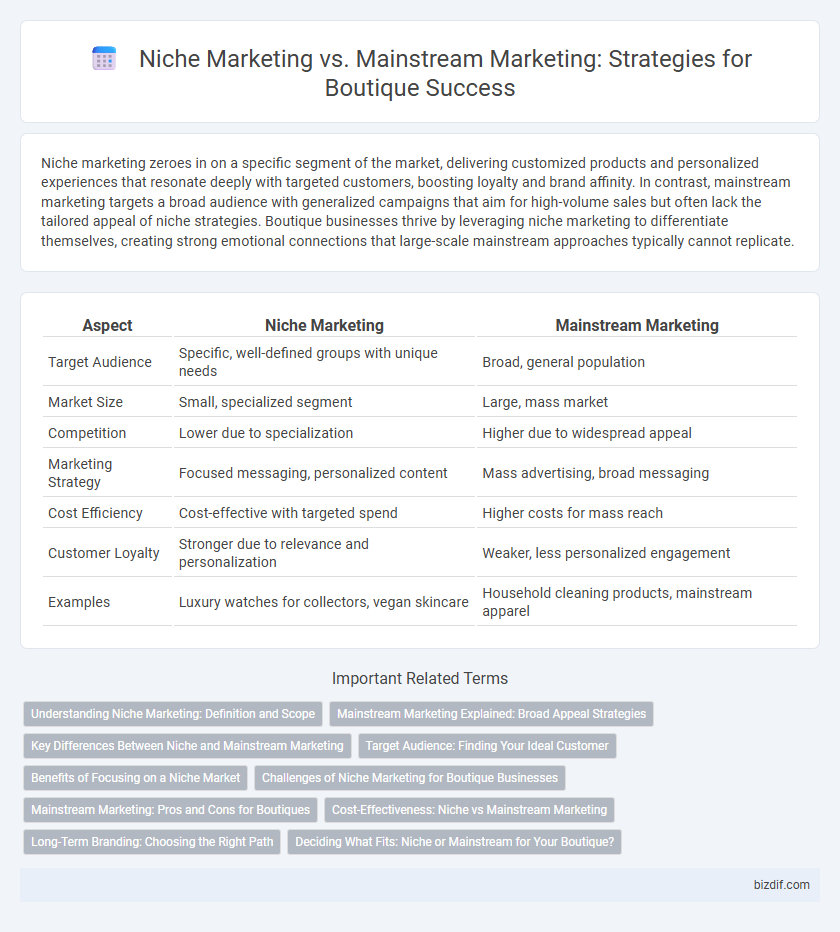Niche marketing zeroes in on a specific segment of the market, delivering customized products and personalized experiences that resonate deeply with targeted customers, boosting loyalty and brand affinity. In contrast, mainstream marketing targets a broad audience with generalized campaigns that aim for high-volume sales but often lack the tailored appeal of niche strategies. Boutique businesses thrive by leveraging niche marketing to differentiate themselves, creating strong emotional connections that large-scale mainstream approaches typically cannot replicate.
Table of Comparison
| Aspect | Niche Marketing | Mainstream Marketing |
|---|---|---|
| Target Audience | Specific, well-defined groups with unique needs | Broad, general population |
| Market Size | Small, specialized segment | Large, mass market |
| Competition | Lower due to specialization | Higher due to widespread appeal |
| Marketing Strategy | Focused messaging, personalized content | Mass advertising, broad messaging |
| Cost Efficiency | Cost-effective with targeted spend | Higher costs for mass reach |
| Customer Loyalty | Stronger due to relevance and personalization | Weaker, less personalized engagement |
| Examples | Luxury watches for collectors, vegan skincare | Household cleaning products, mainstream apparel |
Understanding Niche Marketing: Definition and Scope
Niche marketing targets a specific, well-defined segment of the market with unique needs, preferences, and identity, differing from mainstream marketing which aims at a broad audience. Boutiques excel in niche marketing by offering specialized products or services tailored to distinct customer groups, creating strong brand loyalty and reduced competition. This focused approach allows boutiques to deeply understand customer desires, optimize inventory, and command premium pricing within their specialized market scope.
Mainstream Marketing Explained: Broad Appeal Strategies
Mainstream marketing targets a wide audience through mass media channels, aiming to maximize reach and brand recognition. Strategies often involve standardized products and messages designed to appeal to general consumer preferences, enhancing efficiency and scale. This broad appeal approach prioritizes uniformity and volume, contrasting with the tailored focus of niche marketing.
Key Differences Between Niche and Mainstream Marketing
Niche marketing targets a specific, well-defined segment of the market with tailored products and messaging, optimizing customer engagement and loyalty. Mainstream marketing aims at a broad audience, leveraging mass appeal and standardized campaigns to maximize reach and sales volume. Key differences include audience size, marketing strategy customization, and resource allocation, with niche marketing emphasizing specialization and mainstream marketing focusing on scale.
Target Audience: Finding Your Ideal Customer
Niche marketing targets a specific, well-defined audience whose unique needs align with specialized products or services, maximizing engagement and loyalty. In contrast, mainstream marketing appeals to a broader demographic, emphasizing mass appeal and scalability over personalization. Identifying your ideal customer involves analyzing demographics, preferences, and behaviors to tailor messaging that effectively resonates within your boutique market segment.
Benefits of Focusing on a Niche Market
Focusing on a niche market allows boutiques to tailor products and services to highly specific customer needs, resulting in stronger brand loyalty and higher customer retention. This targeted approach reduces competition by addressing unique preferences often overlooked by mainstream marketing, enabling boutiques to command premium pricing. Enhanced customer insights from niche marketing facilitate personalized experiences and efficient resource allocation, maximizing return on investment.
Challenges of Niche Marketing for Boutique Businesses
Boutique businesses face unique challenges in niche marketing, including limited audience reach and higher customer acquisition costs due to specialized product offerings. The need for in-depth market research and personalized customer engagement demands significant time and resources, often straining small-scale operations. Maintaining brand differentiation while scaling growth presents additional difficulties compared to mainstream marketing strategies that target broader consumer bases.
Mainstream Marketing: Pros and Cons for Boutiques
Mainstream marketing offers boutiques the advantage of reaching a larger audience, which can boost brand visibility and sales volume, crucial for scaling business operations. However, this approach often requires higher marketing budgets and risks diluting the boutique's unique brand identity by appealing to a broad market segment. Balancing the increased exposure with the potential loss of exclusivity is essential for boutiques when leveraging mainstream marketing strategies.
Cost-Effectiveness: Niche vs Mainstream Marketing
Niche marketing is more cost-effective than mainstream marketing because it targets a specific audience, reducing wasted advertising spend and increasing ROI through personalized campaigns. Mainstream marketing requires larger budgets to reach a broad, generic audience, often resulting in higher customer acquisition costs. Businesses leveraging niche marketing benefit from focused resources, leading to more efficient use of marketing budgets and stronger customer engagement.
Long-Term Branding: Choosing the Right Path
Niche marketing targets specific customer segments with tailored products and messaging, fostering deep brand loyalty and long-term engagement within a focused audience. Mainstream marketing aims for widespread appeal, driving volume sales but risking diluted brand identity over time. For boutique businesses, prioritizing niche marketing enhances sustainable growth and solidifies a distinct market position essential for enduring brand equity.
Deciding What Fits: Niche or Mainstream for Your Boutique?
Choosing between niche marketing and mainstream marketing for your boutique hinges on understanding your target audience and product uniqueness. Niche marketing allows boutiques to cater to specific customer preferences, creating a loyal and engaged community with tailored offerings. Mainstream marketing targets broader demographics, emphasizing volume and brand recognition but may dilute personalized customer experiences essential for boutique success.
Niche Marketing vs Mainstream Marketing Infographic

 bizdif.com
bizdif.com